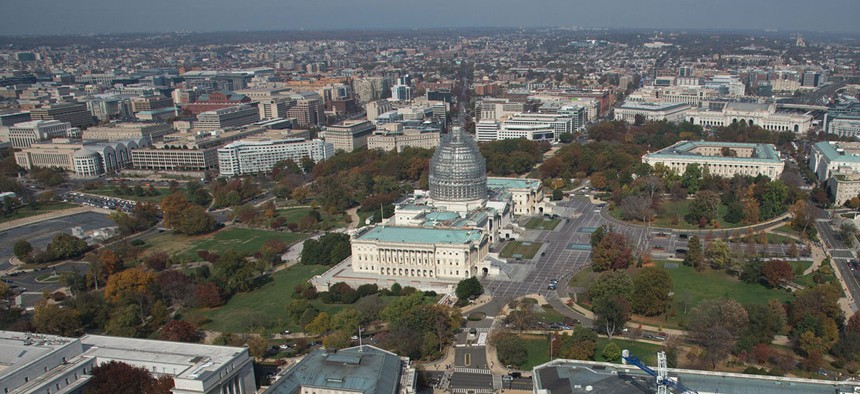
Architect of the Capitol
Election Years and Smooth Spending Bills Don’t Mix
Hill leaders are hoping to pass all 12 appropriations measures separately this year. It's unlikely to happen.
Congress is heading back to Washington with a big goal in mind: passing all 12 appropriations bills on time. But as with all New Year’s resolutions, this is going to be a hard one to keep.
Members of Congress now find themselves in the true opening stages of the 2016 election. Presidential years tend to suck the air out of Washington, leaving members to keep the government’s doors open and lights on, while real political battles are fought in Iowa and New Hampshire.
But key members of both parties say they won’t be mere window dressing to the presidential election this year, expressing confidence in both chambers that while their candidates square off in debates and at ballot boxes, they can pass 12 new appropriations bills that will fund the government and, potentially, make major changes to the way the federal government operates and spends its money.
“This hasn’t been done since 1994, but it’s how Congress ought to operate so that we can better protect the taxpayer dollars and make our place the true representative body that it is,” House Speaker Paul Ryan said in December.
That’s not a small goal. Appropriations bills, which fund everything from the military to research for Alzheimer’s to Congress’s own operations, are complex, time-consuming, and often politically contentious.
But after years of passing massive omnibus spending bills, often at the last minute, like the $1.1 trillion package they passed last month, Ryan and Senate Majority Leader Mitch McConnell say they’re up to the task. Democrats have said that they are on board as well, giving Republican leaders some hope.
Mark Murray, a former House Appropriations Committee staffer and now the vice president of Cornerstone Government Affairs, is skeptical. “This is, after all, the season of optimism, the beginning of the year, goodwill and so forth,” Murray said Tuesday. Like a Jan. 1 vow to hit the gym, Congress’s current optimism may not last through the year. Here are some of the major hurdles they’ll face in the process.
1. It hasn’t been done in more than 20 years. Congress hasn’t passed all 12 appropriations spending bills through both the House and Senate since 1994, when Democrats controlled both chambers, President Bill Clinton was in the White House, and Sen. Lindsey Graham’s beloved flip phones were advanced technology.
Since then, Congress has typically been able to agree to five or six appropriations bills on less contentious issues, like funding the Defense Department, lumping the rest of the government’s funding into a last-minute omnibus package. At worst, as has been the case in recent Congresses, they haven’t passed any.
2. “Problem child” appropriations bills. Every year, members of the House and Senate Appropriations committees find themselves at loggerheads over a few of the most controversial bills—“problem child” bills, as Murray, calls them. These include funding bills for the Labor Department and Health and Human Services Department; the State Department and foreign operations; the Homeland Security Department; and the IRS and the White House (which fall under the umbrella of the Financial Services subcommittee).
Those bills are difficult to pass through one chamber, much less both of them, in an average year (see point 1, above). But in a presidential-election year focused on the economy and taxation, the fight against ISIS, immigration, and refugees from Syria, not to mention health care, all of these bills will be breeding grounds for political fights.
3. Obamacare. House Republicans spent their first week of 2016 in Washington sending a full repeal of the Affordable Care Act to President Obama’s desk, a move that will certainly earn a presidential veto but has nonetheless been a major ideological victory for the Republican Congress. Given Congress’s recent tendency to pass massive omnibus bills just before a deadline for a government shutdown, Republicans have largely left the health care law alone in the appropriations process, proposing only changes that have some bipartisan support.
But if members are given the opportunity to pass a separate Labor/Health and Human Services bill this year, one that could be vetoed without threatening a shutdown, appropriations-watchers expect that taking down at least some parts of Obamacare in the process could be a top priority for the GOP. That’s certainly going to raise some feathers among Democrats. And while Republicans could have the numbers to get an Obamacare repeal or change through committee, and potentially through the House, they’ll need to get five Democratic votes in the Senate to send that bill anywhere.
4. It’s 2016, stupid! On the one hand, Republican leaders say they won’t let the presidential election keep them from doing their own work and, in fact, hope to act to create a policy platform for their eventual nominee and the party writ large to run on in November. But on the other hand, there’s a lot more to the 2016 election than just the presidential race.
Republicans have five candidates seeking reelection to the Senate in states that Obama won twice. And four of them already have pretty serious Democratic opposition, while Sen. Pat Toomey of Pennsylvania awaits the outcome of a three-way primary to oppose him in November. For these members and vulnerable Republicans in the House, passing all 12 appropriations bills is a double-edged sword. Appropriations bills are typically amendable, giving members an opportunity to put up an amendment or several that could help out back home before the election, but that sets up vulnerable members for a lot of tough votes on controversial amendments offered by other members, including anything from abortion rights to immigration to gun control.
5. Obama’s new gun regulations. Speaking of gun control, Obama threw a bit of a wrench in the appropriations process on Tuesday by announcing several new executive orders related to guns. Although the president said that he was moving to circumvent Congress until the legislative branch “gets on board with common-sense gun-safety measures,” he can’t quite circumvent it entirely. Even before Obama’s announcement on Tuesday, Republicans were already pointing to the appropriations process as a potential place to shut down the new executive orders.
Members of Congress can’t technically legislate through appropriations bills, but they can fund—or more likely in this case, defund—various departments or actions. And if Obama hopes to hire more people to conduct background checks and build up the Bureau of Alcohol, Tobacco, Firearms, and Explosives, he’ll likely need more money from Congress to do it.
6. The House Freedom Caucus. Many members of the conservative House group have yet to see a federal spending bill they liked. And while Republicans will have greater control over the appropriations process by starting with all 12 bills early than in a deadline-driven mad dash to file an omnibus, it’s unlikely that Ryan can count on the votes of Freedom Caucus members for any of the appropriations bills.
Typically, former House Speaker John Boehner relied on a coalition of establishment Republicans and Democrats to pass spending bills, a tactic Ryan had to use at the end of 2015, when 95 of his members bailed on the final omnibus package. It’s unlikely that the number of Republican defectors will be that high on a single appropriations bill; many of the so-called “hope yes, vote no” caucus objected to the mere size of the omnibus package and the lack of time to properly go through it.
But with the stakes much lower for a single appropriations bill on the floor monthsbefore the government’s funding runs out, it’s unclear how much pressure either Republicans or Democrats will feel to make up for the “nays” from Freedom Caucus members and other spending-minded Republicans.
7. Running out of time. Although both leaders have promised floor time for appropriations bills and there isn’t much else on the congressional to-do list for 2016, the timeline is still tight. Members hope to have all 12 bills done, at least in the House, before the conventions begin in July and members depart for their August recess, Murray said. That means that appropriators will begin holding hearings on the bills later this month, with plans to begin getting them on the House floor in March, he added. That timeline leaves very little room for error and any major fights could cause major scheduling issues.
8. Syrian refugees and other “poison-pill” riders. As with the Affordable Care Act, Republicans are expected to at least attempt to attach language to one or more of the appropriations bills dealing with Syrian refugees, a major issue for the party that was left unresolved at the end of 2015 and could cause serious headaches for Democrats. Other so-called “poison-pill” riders could include language on abortion rights, campaign finance measures supported by McConnell that failed to make it into the 2015 omnibus bill, additional gun-control measures supported by Democrats, and others. Senate Minority Leader Harry Reid has also indicated he may try to wrangle another controversial issue into the appropriations process: killing the long-contested nuclear-waste site at Yucca Mountain in Nevada once and for all.
9. The budget resolution. Although Congress passed a two-year budget deal last year, they’ll still have to wait on a budget request from Obama, expected to come down sometime in February, and pass budget resolutions of their own. Last year’s budget deal makes it unlikely that there will be major fights over the spending caps agreed to in 2015, but upsets are still possible and the timing of a final resolution could further hamper appropriators’ already tough timeline.
NEXT STORY: Obama Sends Mixed Message With Immigration Raids







